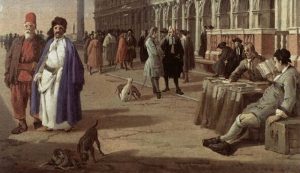One of our majors, Katie Kirk, has an op-ed on Roy Moore in the New York Times today. (Or the New York Times, if you really prefer.) Congratulations, Katie!
Archive | December 12, 2017
Merchants of Venice; or, the Liberty of Strangers
Last night I dreamed that I was living back in Ithaca (or somewhere very much like Ithaca), and that I was organising an APEE panel with Walter Block on the subject of Venetian libertarianism.
In the real world, I haven’t lived in Ithaca for nearly three decades; and while I am currently organising an APEE panel, I’m not doing it with Walter and it’s not on Venetian libertarianism.
But when I woke up, the reference to Venetian libertarianism reminded me of this passage from William Thomas, a Renaissance-era Welsh traveller who described his visit to Venice in a 1549 memoir:
All men, specially strangers, have so much liberty there that though they speak very ill by the Venetians, so they attempt nothing in effect against their state, no man shall control them for it. … Further, he that dwelleth in Venice may reckon himself exempt from subjection. For no man there marketh another’s doings, or that meddleth with another man’s living. If thou be a papist, there shalt thou want no kind of superstition to feed upon. If thou be a gospeler, no man shall ask why thou comest not to church. If thou be a Jew, a Turk, or believest in the devil (so thou spread not thine opinions abroad), thou art free from all controlment. For eating of flesh in thine own house, what day soever it be, it maketh no matter. And generally of all other things, so thou offend no man privately, no man shall offend thee, which undoubtedly is one principal cause that draweth so many strangers thither.
(William Thomas, The History of Italy (1549), ed. George B. Parks (Ithaca NY: Cornell University Press, 1963), p. 83.)
 Of course, the requirement to “spread not thine opinions abroad” (at least in matters of religion) suggests that this freedom had its limits – though I’m not sure whether Thomas intends this restriction to apply to all three of the non-Christian religions he references, or only to devil worship. Still, Thomas’s description of Venice is reminiscent of Voltaire’s and Addison’s descriptions of the London stock exchange; all three passages illustrate commercial society’s capacity to promote cosmopolitanism and toleration.
Of course, the requirement to “spread not thine opinions abroad” (at least in matters of religion) suggests that this freedom had its limits – though I’m not sure whether Thomas intends this restriction to apply to all three of the non-Christian religions he references, or only to devil worship. Still, Thomas’s description of Venice is reminiscent of Voltaire’s and Addison’s descriptions of the London stock exchange; all three passages illustrate commercial society’s capacity to promote cosmopolitanism and toleration.